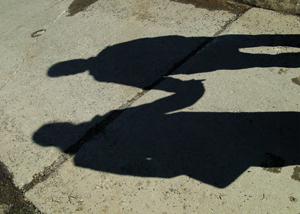
 Ask a classroom of third grade students to describe a shadow and the answers can vary greatly.
Ask a classroom of third grade students to describe a shadow and the answers can vary greatly.
A dark spot, says one. Sun shining when you move, says another.
Taking the time to assess these students’ wide-ranging thoughts before conducting a lesson can provide a more targeted plan. That’s the conclusion of three School of Education recent graduates whose work has been published in the Spring 2012 issue of MSTA Journal.
The students, Annelyse Bawol, Heather Hawrylak and Aimee Gubbini, conducted the research as part of EXPS 420, Science Capstone, under the guidance of Charlotte Otto, professor of chemistry.
During their research project, the UM-Dearborn students developed an assessment method to determine elementary students’ understanding of shadows. What they found was a general lack of knowledge and non-scientific conceptions.
As stated in their paper, “The information gleaned from that assessment was surprising and provided direction for development of 5E inquiry lesson plans targeted towards improving student knowledge.”
Because of their assessment, Bawol, Hawrylak and Gubbini suggested outdoor activities to address issues like shadow length to help students better understand the topic.
“If a pre-assessment was not conducted, teachers would not know what alternative ideas students had and thus they would not be creating lessons and activities that would focus on what the students need to further their understandings,” the SOE students concluded.
Otto sees the publication of the final result as an added bonus to the goals of the capstone project—students demonstrating the ability to assess knowledge, analyze data and teach for impact.
“These projects are vey helpful in supporting the start of their careers,” Otto said. “They have concrete evidence that they can teach real students in real classrooms.”
Bawol agreed and added, “This experience shows me that if I can't seem to find what I need, I can go out and take the necessary steps to research on my own. Throughout the whole process, my group members and I felt like we were actually having a hand in helping future educators.”
Otto hopes more students will consider pursuing publication for their capstone projects.
“The projects where I have approached students about possible publication have been ones where something new or interesting appeared as a result of their efforts,” she said, “and I thought others would be interested in reading about their results.”




